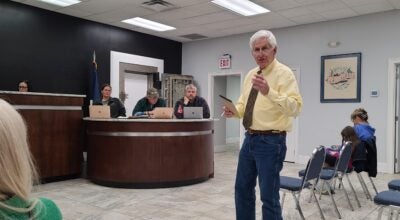Ky. bill shot down over open records concerns could be back in 2020
Published 8:18 pm Friday, July 12, 2019
Open government advocates sounded the alarm in January about a Kentucky Senate bill they feared could “eviscerate” open records. The bill died quickly, getting withdrawn by its sponsor Sen. Danny Carroll (R-Paducah) less than a day after he formally introduced it.
But the bill first known as Senate Bill 14 and later as Senate Bill 193 has not gone away. Its authors are refining it over the summer, with plans to reintroduce it in 2020. This time around, it may feature modifications intended to make it more palatable for defenders of the state’s Open Records Act.
The bill’s primary goal is to protect the personal information of police officers and other public officials who might be at increased risk of threats from members of the public, according to previous statements by Carroll and comments from some of those involved with this summer’s negotiations. Carroll did not respond to a request for comment.
“I do not want to make changes to the Open Records Act that would have a negative impact on transparency,” Carroll told the Kentucky Center for Investigative Reporting in January, after his proposal came under heavy fire. “As we move through this process, I’m open to hearing from anyone who has concerns and exactly what their concerns are.”
The latest version of Carroll’s bill was set to be heard by the Joint Interim Committee on Judiciary yesterday, before it was pulled from the agenda early in the week.
That’s a positive development that came out of a Monday meeting with representatives of the Kentucky Press Association, according to David Thompson, KPA’s executive director.
Thompson said he; a KPA attorney, Michael Abate; and a KPA lobbyist met with Carroll and a Homeland Security Agent who helped author the proposal and is “pretty much behind this effort.”
The meeting “enlightened us because some of the questions we’ve had about this — he was able to clear up,” Thompson said. “There are things that are not stated in the legislation that we think will now be stated. I’m not going to say we’ll support it; I’m not even going to say we’ll be neutral on it. But there will be improvements.”
Abate confirmed the meeting Monday was “productive” and allowed Carroll and those concerned about his bill to come to a better understanding of each other’s perspectives. Carroll agreed to continue working with KPA on refining the bill’s language; Abate said there isn’t a timeline at this point for that work to be done.
Abate said there is an honest effort being made on both sides to “find as much common ground as possible on the bill” — but he noted “we certainly didn’t agree on every opinion.”
One of the widest chasms between the two sides, according to Thompson and Abate, is over whether the existing open records law in the state already offers strong enough protections for personal information.
“We think these things are covered already. They’re talking about Social Security numbers, addresses …” Thompson said. “Our basic point is the stuff they’re trying to keep private is already covered under the public records law. So why worry about it?”
As it was originally written, the bill would have prohibited disclosure of “personal information” in public records for 10 categories of public employees: police officers; first responders; most judges; social workers in the Cabinet for Health and Family Services, Department of Health who investigate child abuse or neglect; Department of Financial Institutions employees who investigate fraud or neglect; Department of Revenue employees; current and former prosecutors; Department of Corrections officers; and emergency dispatchers.
The bill would have created a $500 penalty for disclosing the newly protected records and introduced a new legal concept that open records requests could be considered “frivolous” based on why a requester wants the information. The bill would have allowed judges to decide that an open records request was made for “an improper purpose” and hold the requester liable for the government’s costs in fighting the request.
The financial penalties are still a part of what Carroll is proposing, according to Abate. He said KPA “expressed our concerns” on Monday to Carroll that public officials would be discouraged from releasing any public records, whether they were exempt from disclosure or not, out of fear of the financial penalties.
Amye Bensenhaver, a former assistant attorney general and a founder of the Kentucky Open Government Coalition, was scheduled to testify against Carroll’s bill at the Friday hearing before it was withdrawn. She released what would have been her testimony on the coalition’s Facebook page earlier this week.
“I know (Kentucky’s open records) law. I know its strengths and its weaknesses. I know where improvements are needed,” she wrote. “… The problem this bill is intended to address simply does not exist. Twenty-five years of mediating open records disputes taught me that Kentucky’s public agencies do not release personal information about their employees. Public agencies are more apt to withhold unprotected information about their employees than they are to disclose protected information.”
Thompson said he considers the bill to be “a solution looking for a problem.”
“We don’t see that they need to do anything because the law is strong enough as it is. It’s one of the best open records laws in the country,” he said. “If we were seeing a lot of examples where the information was being abused or misused, things were happening that justified the changes, we’d certainly be understanding and willing to offer some language to correct that. But we’re not aware of those situations.”
Thompson pointed out the public officials listed in Carroll’s bill are not the only people who face increased risk of threats due to their work.
“We could come back and say journalists get threatened all the time,” he said. “Think about the five people at the Capital Gazette (in Annapolis, Maryland) that got killed. … We certainly haven’t asked for any of this type of stuff to cover journalists.”
Thompson said he doesn’t think KPA will ever get to the point where it can support Carroll’s bill, but “we might be neutral on it” depending on what changes Carroll makes.
If Carroll’s final bill doesn’t do enough to protect existing open records law to satisfy its current opponents, could it pass the Kentucky legislature anyway? Thompson said he hopes not, then pointed to what happened back in January, the first time Carroll tried:
“Within 24 hours, it went from being introduced to being nonexistent.”







